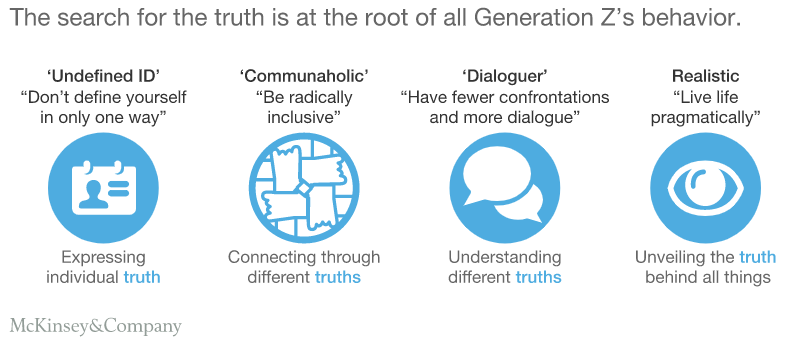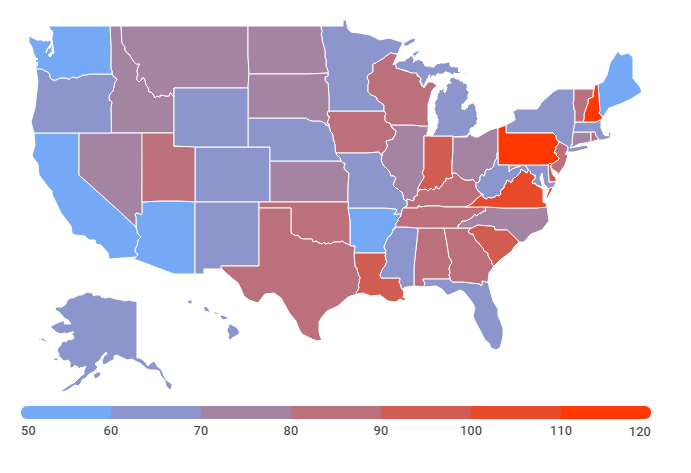How Today's Student is Thinking Smarter about College
They’re digitally savvy. They want a good quality of life and career growth. They've grown up with iPhones in hand, YouTube at their fingertips and instant access to the internet. Nearly 60% of Gen Z is enrolled in college, making your campus the most uniquely diverse it has ever been.

This generation of students has re-conceptualized the world around them. More than previous generations, Gen Z has a particularly evolved outlook on learning, technology, economics, and work, four factors that heavily influence their education choices. As universities compete for the attention and attendance of this new generation, understanding what differentiates, motivates, and inspires Gen Z students is crucial.
By examining Gen Z’s views, assumptions and expectations about learning, technology, economics and work, you can better understand how your university can support and transform for this generation.
The Gen Z View of Learning
Today’s students are the most influential group of educational trendsetters - they make decisions and relate to their educational paths in a highly analytical way.
Gen Zers are accustomed to free, easily accessible information that is both high-quality and up-to-date through services like Khan Academy and Udemy. They rely on YouTube to become more knowledgeable and gain skills that will prepare them for the future - 85% of Gen Z watches at least one video each week to learn a new skill.

With so much information at their grasp, Gen Z is hyper cognitive and excels in more productive split-tasking, splitting time and attention between several tasks at once, continuously refocusing their attention from one task to the other. As a result, Gen Z’s average attention span is just 8 seconds. Time is a commodity and therefore needs to be spent as efficiently as possible.
Your Gen Z students are experts at finding and digesting information quickly and easily. They’re accustomed to instant, curated knowledge, and prefer self-learning, applied learning, and immersive educational experiences.
Universities can benefit from incorporating seamless online and offline experiences, utilizing hands on and visual elements to enhance the student experience and increase consumption. While a class meets in-person to foster discussion and apply concepts to real situations, the professor teaches with interactive courseware, blending the online and offline worlds.
With the expectation of personalized education, universities that allow for autonomy in choosing courses and education paths create greater student satisfaction. Nearly half of Gen Z prefers self-directed, independent learning. They don’t feel they have the time to keep up with or learn new skills, but understand the importance of and are motivated by the implicit career advancement an education allows.
A Digital Generation In College
Although their Millennial peers may be perceived as the digital generation, Gen Z are the true digital natives who were born into the era of social media, smartphones, and online learning; 80% of Gen Z received their first smartphone at just 12-years-old.
Gen Z saw shifts in culture, government, and policy born on digital devices, so they believe change is within their power — and that it can be created through technology.
With 55% of Gen Z using their phone more than 5 hours per day, their world is digital and they expect a university experience that matches their reality. Colleges and universities must make every attempt to meet these students where they are and prove their programs have the technological savvy and innovation that will carry the students through their years in school and prepare them for life after graduation.
Generation Z expects the university to know their needs and customize the student experience with more thought than campus-wide wifi, a 3D printer in the library, and device charging centers. It means implementing technology that knows student information, from the courses they’re taking to the materials they require, and making this content available to them no matter where they are. Picking up a phone, standing in line to submit a registration form, or buying a stack of books in-person just isn’t in the mindset or culture of Gen Z. They expect alternatives that are easily accessible on mobile, everything needs to be quick and easy.
At the Ohio State University, embracing Gen Z’s digital needs is a top priority. In 2018, OSU issued 11,000 iPads to incoming students and the university plans to develop an app for customized course planning. One OSU professor, Nicole Kraft, has adapted to the needs of Gen Z students, posting assignments to Slack and holding office hours over Zoom.

For student retention and recruitment, universities cannot ignore Gen Z’s trust in online reviews and recommendations - over two-thirds of Gen Z consults online reviews of institutions, and it should be no surprise that 67% consider schools via social media. They have more research tools at their disposal than previous generations could have ever imagined. These students are sizing up universities long before they ever decide to submit an application.
The Economics of Gen Z
Gen Z has seen Millennials struggle with debt and, as a consequence, are actively careful to reserve debt for select purchases with a quarter of them viewing it as something to be avoided at all costs. This generation is significantly more entrepreneurial and has developed a “side-hustle” culture as a means of avoiding the confines of debt.
This means Gen Z is not only price conscious, but that they expect to get the most value for their dollar. 100% of Gen Z stated they compare prices while shopping, which includes college tuition and the cost of class materials. In one study, 80% of Gen Z respondents listed price as the biggest factor in their purchasing decision.
As a result of this sensitivity, Gen Z has developed a unique view of consumption - having access to products or services, not necessarily owning them. A recent McKinsey study confirms “As access becomes the new form of consumption, unlimited access to goods and services (such as car-riding services, video streaming, and subscriptions) creates value.”
Gen Z may have a new view on ownership and be hesitant to take on debt, but they are happy to connect their finances and technology; three quarters of students have a money or payment app on their phone, they’re ready to purchase through their device at all times.
With 66% of Gen Z listing student debt as a top concern, students are looking for value. For some universities, including class materials in the cost of tuition has created affordability and a student-centric pricing strategy that appeals to Gen Z students. Additionally, universities that give students the option for digital, rental or used materials and online exchanges have also been successful in attracting a price-sensitive generation of consumers.
And, because Gen Z is financially conscious, creating work programs or fostering entrepreneurship on campus will provide students with new ways to lower education costs and avoid debt.
Evolving Definitions of Work and Career
Gen Z has grown up during a time where employment has undergone a revolution. From the emergence of the gig economy to a highly globalized workforce, your Gen Z students cannot imagine graduating from college, climbing the corporate ladder and retiring after just one or two employers.
This generation is open to short-term, contract-based jobs, which offer flexibility and variety and have expectations that this is the normal course of their career. Gen Z believes their work should offer greater meaning and purpose, not just a paycheck.
As artificial intelligence and automation will have significant impacts on Gen Z employment, they know they’ll be competing globally for work—yet they also prize a work/life balance and personal fulfillment alongside their career.
Universities can make a positive impact with a campus career center that is tailored to the reality of the gig economy, prepares students for their job search, and for a successful post-graduation career. Gen Z wants to see the value of their education, especially as it relates to job security and stability.
Designing courses that are directly applicable or feature real-life experience can support a generation that may already be working as they study. Creating global experiences and international connections, especially with underserved populations, positions a university as a socially conscious, modern institution that understands the priorities of the distinctive Gen Z community.
Supporting Generation Z
While Gen Z brings new expectations and challenges for universities, they also bring a sizeable student community that are inherent brand promoters. As Gen Z goes through college and new generations enroll, the features and experiences of a digitally savvy, responsive, global generation will only become more pronounced, so universities must focus their efforts on innovating the educational experience now to succeed in the future.
To learn more about how Akademos is helping its university clients innovate their student experience and attract Gen Z, contact us.




